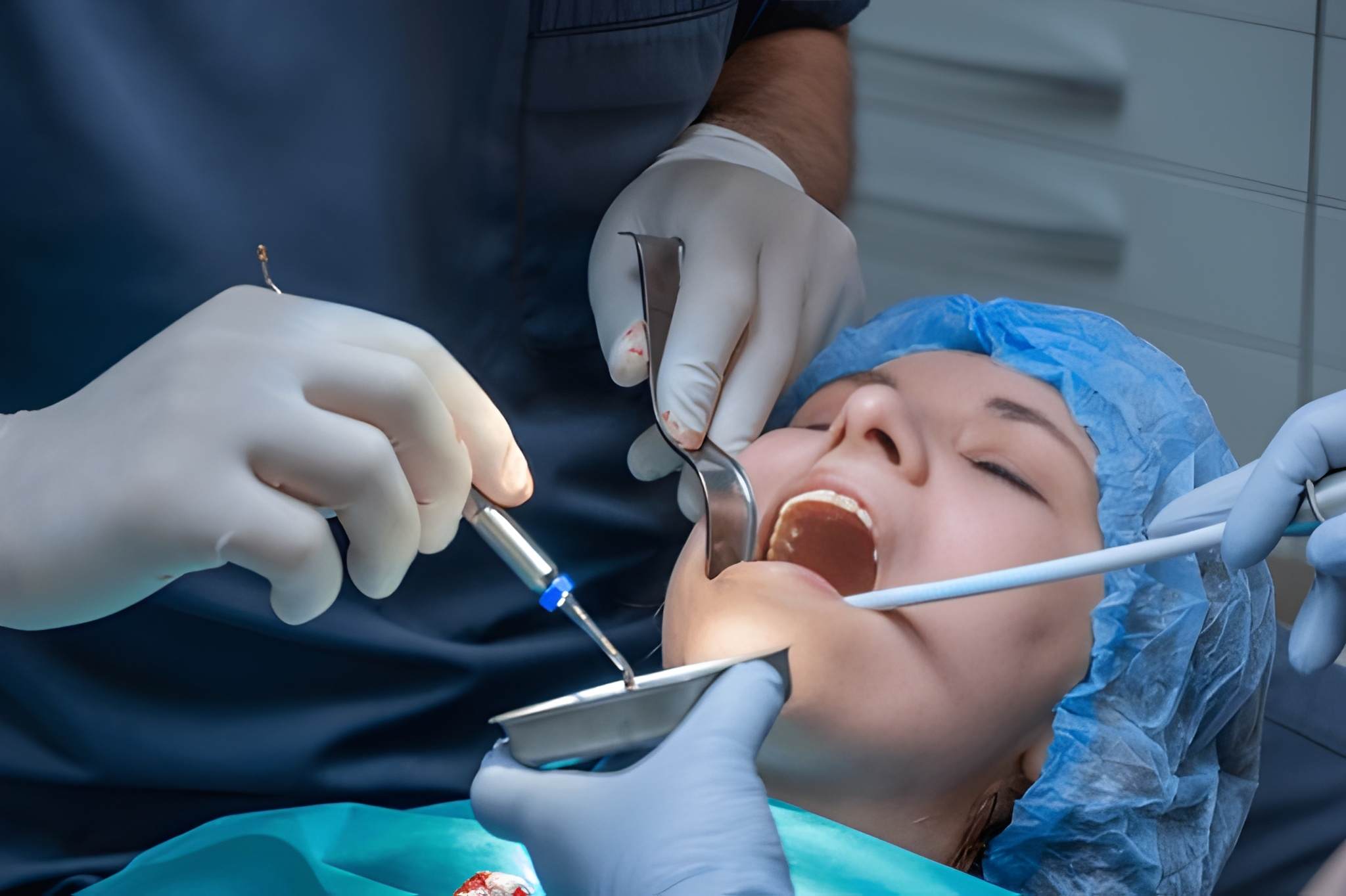Welcome to our comprehensive guide on relieve pain from dental implants. Dental implant surgery is a common procedure for replacing missing teeth and restoring oral function and aesthetics. While the benefits of dental implants are numerous, some patients may experience discomfort during the recovery process. In this blog, we will delve into the various factors contributing to postoperative pain after dental implant surgery and explore effective strategies for managing and alleviating this discomfort.
What are Dental Implants?
Dental implants are artificial tooth roots made of biocompatible materials such as titanium. They are surgically placed into the jawbone to support replacement teeth or dental prostheses, such as crowns, bridges, or dentures.
Explaining Dental Implants
Dental implants mimic the structure and function of natural teeth, providing a stable foundation for prosthetic teeth that look, feel, and function like real ones. Unlike traditional dentures or bridges, which rely on adjacent teeth for support, dental implants are standalone structures that integrate with the jawbone through a process called osseointegration.
Their Importance in Restorative Dentistry
Dental implants play a crucial role in restorative dentistry by offering a long-lasting solution for tooth replacement. They help restore oral function, including chewing and speaking, and prevent bone loss in the jaw. Additionally, dental implants can improve the aesthetics of a smile, enhancing confidence and self-esteem in individuals with missing teeth. Overall, dental implants contribute to better oral health and quality of life for patients seeking tooth replacement options.
Preparing for Dental Implant Surgery
Before undergoing dental implant surgery, it’s essential to prepare yourself both mentally and physically for the procedure. Here are some key steps to ensure a smooth and successful experience:
Mental Preparation
- Understand the Procedure: Take the time to educate yourself about the dental implant process, including the steps involved, potential risks, and expected outcomes. Your dentist or oral surgeon can provide detailed information and address any concerns you may have.
- Manage Expectations: Have realistic expectations about the results of the surgery and the recovery process. While dental implants offer numerous benefits, such as improved oral function and aesthetics, it’s essential to understand that the procedure may involve some discomfort and require a period of adjustment.
- Address Anxiety: If you experience dental anxiety or fear of surgery, discuss your concerns with your dental care provider. They can offer reassurance, recommend relaxation techniques, or even prescribe anti-anxiety medication to help you feel more comfortable during the procedure.
Physical Preparation
- Oral Health Evaluation: Ensure that your oral health is in good condition before undergoing dental implant surgery. Your dentist may recommend treating any existing dental issues, such as cavities or gum disease, to optimize the success of the implant procedure.
- Medical Clearance: Inform your dentist about any medical conditions you have or medications you’re taking. They may need to coordinate with your primary care physician or specialist to ensure that you’re medically cleared for surgery.
- Lifestyle Adjustments: Make lifestyle adjustments as needed to support your recovery after dental implant surgery. This may include quitting smoking, which can interfere with the healing process, and adjusting your diet to include soft, nutritious foods that are easy to eat during the initial recovery period.
What Causes Pain after Dental Implant Surgery?
After undergoing dental implant surgery, it’s common to experience some degree of discomfort or pain during the recovery process. Several factors can contribute to postoperative pain, including:
- Surgical Trauma: During dental implant surgery, the oral surgeon or dentist makes incisions in the gum tissue and drills into the jawbone to place the implant. This surgical trauma can lead to inflammation and soreness in the surrounding tissues, resulting in discomfort after the procedure.
- Inflammation: Inflammation is a natural response of the body to tissue injury or irritation. After dental implant surgery, the body’s inflammatory response is activated, causing swelling, redness, and pain around the implant site. While inflammation is a necessary part of the healing process, it can contribute to postoperative discomfort.
- Nerve Damage: In rare cases, dental implant surgery may result in damage to the surrounding nerves, leading to persistent or chronic pain. Nerve damage can occur due to surgical trauma, excessive pressure on the nerves, or improper placement of the implant. Symptoms of nerve damage may include sharp or shooting pain, numbness, or tingling sensations in the mouth, lips, or jaw.
- Infection: Infection is a potential complication of any surgical procedure, including dental implant surgery. Bacteria can enter the implant site during or after the surgery, leading to inflammation, swelling, and pain. Symptoms of infection may include fever, increased swelling, foul odor or taste in the mouth, and pus discharge from the implant site. Infections require prompt treatment with antibiotics to prevent further complications and promote healing.
Strategies for Relieve Pain from Dental Implants After Surgery
After undergoing dental implant surgery, it’s essential to take steps to manage pain and discomfort during the immediate postoperative period. Here are some effective strategies for pain management:
Medication
Your dentist or oral surgeon may prescribe pain medications to help alleviate discomfort after dental implant surgery. These medications may include over-the-counter pain relievers such as ibuprofen or acetaminophen, or prescription-strength painkillers for more severe pain. It’s essential to take the medication as directed and not to exceed the recommended dosage to avoid side effects or complications.
Ice Packs
Applying ice packs to the outside of the face can help reduce swelling and numb the area around the implant site, providing relief from pain and discomfort. Wrap a cold pack or a bag of frozen peas in a thin cloth and apply it to the cheek or jaw near the surgical site for 10 to 15 minutes at a time. Be sure to take breaks between icing sessions to prevent skin irritation or frostbite.
Rest and Recovery
Rest is crucial for the healing process after dental implant surgery. Avoid strenuous activities, exercise, or heavy lifting for the first few days following the procedure to allow your body to recover properly. Lie down with your head elevated on pillows to reduce swelling and promote drainage of fluids from the surgical site. Avoid bending over or lying flat, as this can increase blood flow to the head and cause additional swelling.
Natural Remedies for Pain Relief
In addition to conventional pain management techniques, some individuals may find relief from postoperative discomfort through natural remedies and alternative therapies. Here are some natural remedies to consider for pain relief after dental implant surgery:
Herbal Remedies
Certain herbs and botanical extracts have been traditionally used for their analgesic and anti-inflammatory properties, which may help reduce pain and swelling after dental implant surgery. Common herbal remedies for pain relief include:
- Arnica: Arnica montana is often used topically as a cream or gel to reduce bruising, swelling, and inflammation.
- Clove oil: Clove oil contains eugenol, a natural anesthetic and antiseptic compound that can help alleviate toothache and gum pain.
- Chamomile: Chamomile tea or extract may have mild sedative and anti-inflammatory effects, promoting relaxation and reducing discomfort.
Acupuncture
Acupuncture is an ancient Chinese healing technique that involves inserting thin needles into specific points on the body to stimulate energy flow and promote healing. Some studies suggest that acupuncture may help reduce pain and inflammation associated with dental procedures, including dental implant surgery. By targeting specific acupuncture points, practitioners aim to restore balance and alleviate discomfort in the body.
Aromatherapy
Aromatherapy involves the use of essential oils extracted from plants to promote physical and emotional well-being. Certain essential oils have analgesic, anti-inflammatory, and calming properties that may help alleviate pain and promote relaxation after dental implant surgery. Common essential oils for pain relief and stress reduction include:
- Lavender: Lavender oil has soothing and calming properties that can help reduce anxiety and promote relaxation, making it beneficial for managing postoperative pain and discomfort.
- Peppermint: Peppermint oil contains menthol, which has a cooling and numbing effect that can help relieve dental pain and discomfort when applied topically or inhaled through aromatherapy.
Tips for a Speedy Recovery
A speedy recovery after dental implant surgery is essential for ensuring optimal healing and minimizing discomfort. Here are some tips to help you enhance healing and promote a smooth recovery process:
Follow Your Dentist’s Instructions
Listen carefully to your dentist or oral surgeon’s post-operative instructions and follow them diligently. These instructions may include guidelines for pain management, dietary restrictions, oral hygiene practices, and activity limitations. By adhering to your dentist’s recommendations, you can reduce the risk of complications and promote a successful recovery.
Attend Follow-Up Appointments
Schedule and attend all follow-up appointments with your dentist or oral surgeon as recommended. These appointments allow your dental care provider to monitor your healing progress, assess the stability of your dental implants, and address any concerns or complications that may arise. Regular follow-up visits are crucial for ensuring the long-term success of your dental implant treatment.
Maintain Good Oral Hygiene
Practice good oral hygiene habits to keep your mouth clean and free of bacteria during the recovery period. Gently brush your teeth and gums with a soft-bristled toothbrush and fluoride toothpaste at least twice a day. Use an antimicrobial mouthwash to rinse your mouth and help reduce the risk of infection. Avoid vigorous brushing or flossing around the implant site to prevent irritation or damage to the surgical area.
Conclusion
By following these tips after dental implant surgery, you can enhance healing, minimize pain, and achieve the best possible outcomes. Remember to prioritize rest and relaxation, eat a healthy diet rich in nutrients to support healing, and stay hydrated to promote overall well-being during the recovery process. With proper care and attention, you can enjoy the benefits of your new dental implants and restored oral health for years to come.
FAQs
How long does the pain last after dental implant surgery?
The duration of pain can vary from person to person but typically subsides within a week to ten days.
Can I take over-the-counter pain relievers for dental implant pain?
Yes, over-the-counter pain medications like ibuprofen can help alleviate discomfort. However, always consult your dentist for personalized recommendations.
Is it normal to experience swelling after dental implant surgery?
Yes, some swelling is normal after surgery. However, if the swelling is severe or persists for an extended period, contact your dentist.







